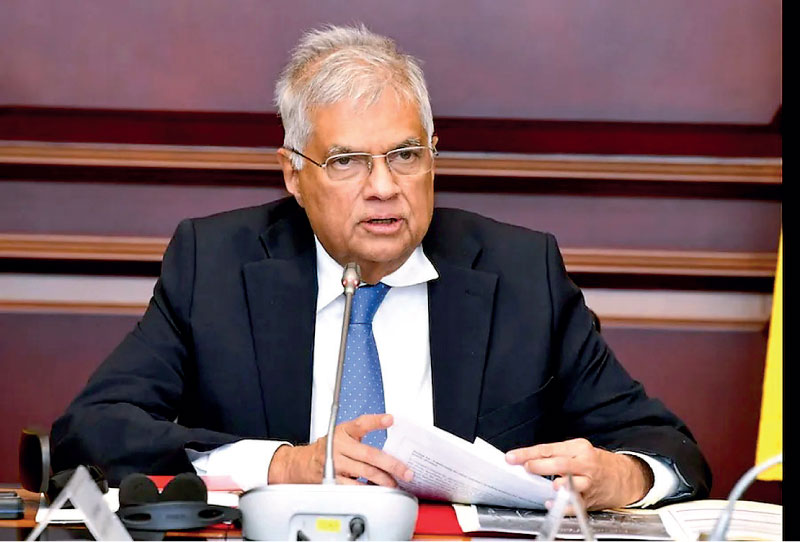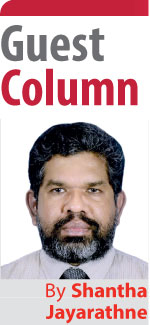Saturday Feb 21, 2026
Saturday Feb 21, 2026
Monday, 10 June 2024 00:15 - - {{hitsCtrl.values.hits}}

President Ranil Wickremesinghe
“The definition of insanity is doing the same thing over and over again and expecting different results”
- Albert Einstein
 I am replying to Cathrine Weerakkody’s (hereafter referred to as Weerakkody) article titled, “President Ranil’s handling of the crisis and what’s next for Sri Lanka”, dated 7 June 2024, in the Daily FT (https://www.ft.lk/opinion/President-Ranil-s-handling-of-the-crisis-and-what-s-next-for-Sri-Lanka/14-762758).
I am replying to Cathrine Weerakkody’s (hereafter referred to as Weerakkody) article titled, “President Ranil’s handling of the crisis and what’s next for Sri Lanka”, dated 7 June 2024, in the Daily FT (https://www.ft.lk/opinion/President-Ranil-s-handling-of-the-crisis-and-what-s-next-for-Sri-Lanka/14-762758).
This reply aims to present a more nuanced perspective, encouraging readers to critically evaluate the narratives put forth and consider the multifaceted challenges facing Sri Lanka.
Cathrine Weerakkody’s article, “President Ranil’s handling of the crisis and what’s next for Sri Lanka,” provides an overly positive narrative about President Ranil Wickremesinghe’s handling of the economic crisis. However, it is essential to scrutinise the broader context and the policies that have contributed to Sri Lanka’s current predicament. A critical analysis reveals that both Wickremesinghe and Sajith Premadasa, leaders of the United National Party (UNP) and Samagi Jana Balawegaya (SJB) respectively, endorse similar neoliberal economic policies which have repeatedly failed to deliver sustainable development.
Neoliberal policies and economic mismanagement
Ranil Wickremesinghe has held significant political power in Sri Lanka, serving multiple terms as Prime Minister and now as President. His tenure is marked by a steadfast commitment to neoliberal economic policies, characterised by deregulation, privatisation, and reliance on foreign loans. These policies have led to increased inequality, poor public services, and a fragile economic structure highly susceptible to external shocks. The UNP and SJB, despite minor rhetorical differences, fundamentally adhere to the same neoliberal ideology, which has proven detrimental to the Sri Lankan economy.
The debt crisis and its implications
Sri Lanka’s debt crisis, with public debt now exceeding $ 100 billion, stems from decades of borrowing to fund infrastructure projects that often failed to yield significant economic benefits. Many of these projects were undertaken under the leadership of Wickremesinghe and his predecessors. The neoliberal approach favoured by the UNP and SJB has resulted in heavy dependence on foreign loans, leading to a cycle of debt and austerity that cripples economic growth and public welfare.
Global examples of neoliberal failures
Internationally, the shortcomings of neoliberalism are well-documented. For instance, countries like Argentina and Greece, which followed neoliberal policies dictated by international financial institutions, experienced severe economic downturns and social unrest. In contrast, nations that have focused on building strong, diverse, and resilient production economies, such as Germany and South Korea, have shown greater economic stability and growth. These examples underscore the need for Sri Lanka to pivot away from neoliberalism and towards a production-based economic model.
The IMF deal and sovereignty concerns
Weerakkody’s article downplays the significant consequences of the IMF deal. While IMF assistance was necessary to prevent an immediate economic collapse, the conditions attached, including austerity measures, have far-reaching negative impacts. These conditions often lead to reduced social spending, higher taxes, and increased unemployment, disproportionately affecting the most vulnerable populations. Furthermore, these agreements can undermine national sovereignty by limiting the government’s ability to pursue independent economic policies.
The need for a production-based economy
Sri Lanka must transition from its reliance on neoliberal policies to a production-based economy that efficiently utilises available resources. This shift involves investing in local industries, agriculture, and technology to create sustainable jobs and reduce dependence on imports and foreign loans. Since the adoption of neoliberal policies in 1977, Sri Lanka has experienced persistent economic instability, proving that such policies are ill-suited for fostering long-term economic health and resilience.
Youth, employment, and education
Weerakkody rightly highlights the aspirations of young Sri Lankans for better education and employment opportunities. However, the current neoliberal policies do not address the systemic issues within the education system and labour market. Substantial investment in education, vocational training, and creating an environment conducive to innovation and entrepreneurship is crucial for retaining and nurturing talent. This approach can help build a skilled workforce that supports a robust production economy.
Leadership and vision for the future
While Weerakkody calls for capable leadership, it is vital to recognise that the same political figures who have contributed to the crisis cannot be the sole architects of its resolution. True leadership requires accountability, transparency, and a commitment to structural reforms that prioritise the long-term well-being of the nation over short-term political gains. The upcoming presidential election offers an opportunity for Sri Lankans to demand leaders who are genuinely committed to transformative economic policies.
In conclusion, while President Ranil Wickremesinghe’s efforts to manage the crisis are acknowledged, it is imperative to critically assess the broader context of his long-standing political influence and the neoliberal policies that have contributed to the current economic situation. Sri Lanka needs a leadership that understands the limitations of neoliberalism and is committed to building a production-based economy that ensures sustainable and inclusive growth.
Out of the three main front runners in the presidential race, only the NPP leader Anura Kumara Dissanayake sets hope on a production-based economy whereas Ranil Wickremesinghe and Sajith Premadasa still believe in crony capitalism that they have been practicing over four decades. Therefore, the upcoming Presidential election is a chance for Sri Lankans to choose a leader who prioritises the nation’s long-term prosperity and stability.
(The writer is a former Senior Consultant at the Sri Lanka Institute of Development Administration (SLIDA) and a Senior Lecturer of a university. He can be reached through [email protected].)